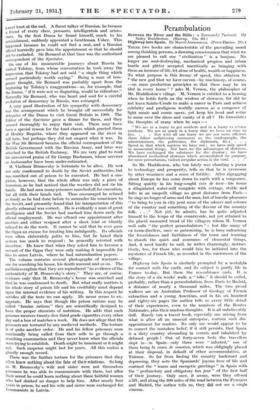Perambulation
Highway into Spain. By Marcel Aurousseau. (Peter Davies. 2 Is. ) THESE two books are characteristic of the prevailing mood among thinking persons, a dawning consciousness that what we
are pleased to call our " civilization " is a boojum. No longer are soul-destroying, mechanical progress and urban bustle and glitter accepted uncritically as bringing with them an increase of life, let alone of health, wealth or happiness. To what purpose is this frenzy of speed, this oblation to the new god that we have carven—by machinery, of course, —on mass production principles so that there may be an idol in every home " ? asks M. Vernon, the philosopher of Mr. Huddleston's village. M. Vernon is entitled to a hearing when he holds forth on the wisdom of slowness, for did he not leave Sainte-Ursule to make a career in Paris and achieve
celebrity and prodigious worldly success as a composer of light music and comic opera, yet keep his head and retire
to muse over the dross and vanity of it all ? He formulate.; the thoughts of many when he says :-
" We are in a hurry to get nowhere and in a hurry t3 return nowhere. Wo are so much in a hurry that we have no time to live. . . . But with- all our hurry we aro not more efficient (here follow unflattering comments on the tradespeople, tho administrators, the politicians, the diplomats, dce.). . . . Speed in that which matters we have not ; we have only speed in unessential things. Nor have we the advantages of slowness. We have exchanged the substance for the shadow ; we have abandoned methodical slowness which accomplished its purpose, for mere perturbation, violent irregular action in the void. . . ."
So Mr. Huddleston, who but lately was chanting a paean to technology and prosperity, tells us that he is overcome by utter weariness and a sense of futility. After zigzagging
about Europe he has come down to earth with a vengeance. Sitting quietly in his long-sought coin de terre—his home
a dilapidated water-mill complete with cottage, stable and lofts in an unspoilt village no great distance from Paris— he sings no longer of arms and the man, but of bucolic pleasures " to bring to you in city pent some of the odours and colours
of the country and something of the flavour of the country folk. . . ." Not yet, he admits, has he quite adjusted himself to the tempo of the countryside, not yet attained to
the placid measured tread of the villagers whom M. Vernon well calls " the perfect perambulators " ; but like many of us town-dwellers, once so patronizing, he is busy unlearning the feverishness and fretfulness of the town and learning to absorb the quiet and assurance of elemental things.
And, it need hardly be said, he writes charmingly, instruc- tively, too, for those who would fain be initiated into the mysteries of French life, as revealed in the microcosm of the village.
Highway into Spain is similarly prompted by a nostalgia for contact with the earth, and its subject is partly life in France to-day. But there . the resemblance ends. It is the story of a six weeks' walk, a " hike," it should be called, probably, rather than a perambulation, from Paris to Madrid, a distance of nearly a thousand miles. The two proud walkers are an Australian Professor of Geology of French extraction and a young American, and in his six hundred and eighty-six pages the author tells us every little detail
of their experiences, even to the numbers of the Routes Nationales, plus their random thoughts. It is all unbelievably dull. Rarely can a travel book, especially one arising from what is after all an unusual enterprise, contain such dis- appointment for readers. Its only use would appear to be to correct the mistaken belief, if it still persists, that Spain
is a dirty country abounding in vermin and inhabited by debased people ! Out of forty-seven beds the travellers slept in—in Spain—only three were " infected," one of them being fa cama de nosotros, which was obligingly placed at their disposal, in default of other accommodation, at Tuirana. So far from finding the country backward and depressing, they note the Spaniards' joyous love of life and contrast the " warm and energetic greetings " in Spain with the " perfunctory and obligatory bon jour" of the first half of their journey. Only once, it seems, were they offered a lift, and along the 390 miles of the road between the Pyrenees and Madrid, the author tells us, they did not see a single cinema.











































 Previous page
Previous page